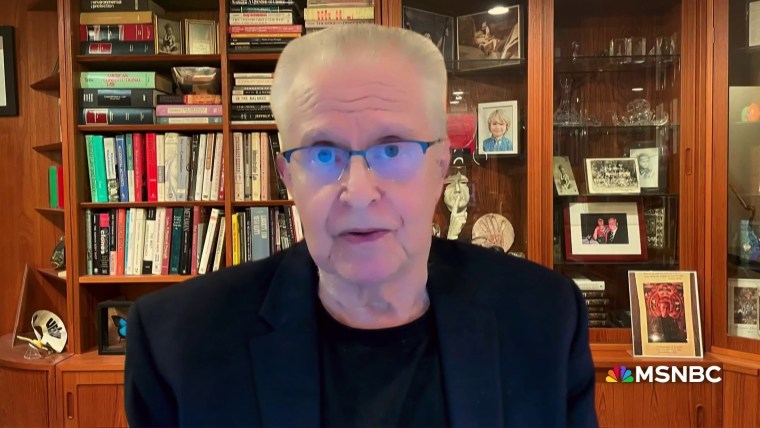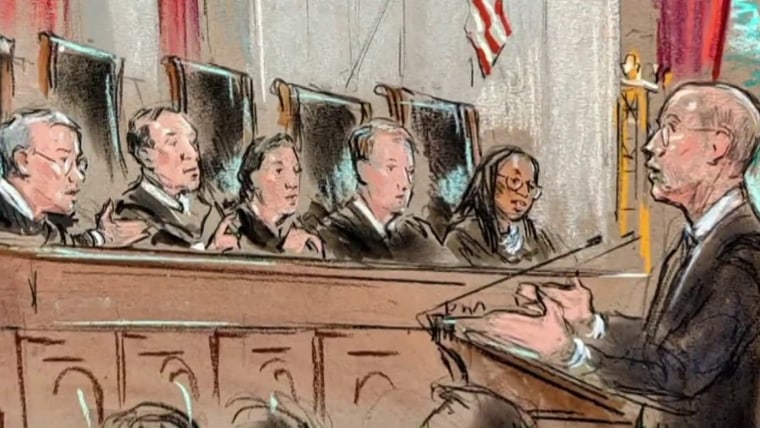An Arizona grand jury handed up an indictment Wednesday that accuses 18 people of crimes related to the attempt to throw the 2020 presidential election for former President Donald Trump. The list of defendants includes not only the 11 Arizonans who were appointed as “fake electors” in that state but also lawyers Rudy Giuliani and Christina Bobb, members of the Trump campaign’s inner circle.
Even though Trump isn’t directly named in the indictment, appearing only as “unindicted co-conspirator 1,” the timing couldn’t be worse for him. The Arizona charges were unsealed the day before the former president’s lawyers appeared before the Supreme Court to claim that his actions in the aftermath of the election were all official and, thus, are covered by a blanket presidential immunity. But the Arizona indictments serve as an important reminder that Trump’s actions after the 2020 election weren’t a mere byproduct of Trump’s serving as president. Instead, Trump was allegedly the head of a criminal enterprise, as the indictment in Georgia calls it, and his efforts can’t be handwaved away as just part of the job.
The Arizona indictments serve as an important reminder that Trump’s actions after the 2020 election weren’t a mere byproduct of Trump’s serving as president.
The charges that Arizona Attorney General Kris Mayes sought and the grand jury handed up focus on one facet of the broader scheme that a Washington grand jury, at the request of special counsel Jack Smith, said existed in a 2023 federal indictment. As part of the attempt to throw the election’s results into doubt, according to that federal indictment, Republicans in several swing states that Joe Biden won cast fraudulent Electoral College votes declaring Trump the winner.
Fake electors cast ballots in seven states, and Arizona is the last of the seven to conclude their investigations into the scheme. Three of the state’s fake electors are co-defendants with Trump in a sprawling conspiracy case in Georgia. State prosecutors in Michigan and Nevada have charged people accused of being fake electors, as well. (The Wisconsin investigation is ongoing, but many of the participants there have admit to their roles to settle a civil suit.) Only prosecutors in Pennsylvania and New Mexico declined to bring charges. They’ve noted that the participants there insisted their certificates included language making it clear that they were truly contingencies and not “real” Electoral College votes.
At the time, the public claim from the Trump campaign was that those “alternate slates” of electors were merely backups in case a court ruled Trump had won those states. But as the Arizona grand jury found, there was a clear belief among those charged that the real reason to produce the fake electoral certificates was to turn Trump’s false claims of election fraud into a vehicle for him to remain in office.

Thursday’s Supreme Court oral arguments took place against that backdrop. Arguing for Trump, D. John Sauer claimed that hidden in the Constitution is total immunity from criminal prosecution for presidents after they leave office for their official acts. His argument depends on an extremely broad interpretation of the Supreme Court’s 1982 Nixon v. Fitzgerald ruling, which found that presidents possess immunity from civil suits brought in response to their decisions, even those taken on the “outer perimeter” of their official capacity.
It’s an argument that should carry little weight given how clearly even those of Trump’s actions he took as an officeholder, rather than an office seeker, were undertaken for a personal aim. Speaking with the vice president or making calls about election integrity to the Arizona Legislature might be things a president could be expected to do, but not as part of a scheme to overturn the will of American voters. Despite that, conservative justices Samuel Alito and Neil Gorsuch appeared extremely willing to entertain Sauer’s arguments and look beyond the facts of the current case to imagine a hypothetical dystopian future in which all presidents are paralyzed for fear of criminal prosecution once they leave office.
The Supreme Court would do well to focus on the immediacy of the present rather than hide behind hypotheticals.
Fortunately, Smith prepared for such a possibility. In his brief, he argued that even if the court does find that some form of immunity exists for official acts, enough unofficial conduct was still built into the indictment that the case should still be able to proceed immediately to trial. When Justice Amy Coney Barrett addressed Smith’s brief, Sauer was forced to admit that several of those things that the special counsel listed are, in fact, private acts. Take, for example, Trump’s employing private lawyers (Giuliani included) to spread false rumors about the election results and proceed with the fake electors plot.
As Justice Ketanji Jackson Brown pointed out, the hair-splitting about what counts as an official act goes beyond what Trump has requested, which is a ruling on whether an absolute immunity from criminal prosecution exists. Anything more than that question, which should quickly be answered in the negative, is just another way to delay his trial.
It appeared unlikely, though, that the justices will issue a swift decision, despite the clear out that Smith has given them to split the difference and allow the trial to proceed. As eager as some of the conservative justices were to ignore the facts of the case, the unsealing of the charges in Arizona on Wednesday is a reminder to everybody paying attention that there was a real attempt, which involved the president of the United States, to overturn the results of an American election. The Supreme Court would do well to focus on the immediacy of the present rather than hide behind hypotheticals.

